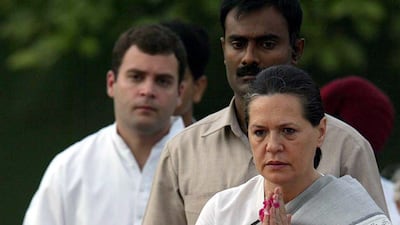It began like a fairy tale.
A young Italian woman, working as a waitress at a Greek restaurant to make ends meet, encountered a dashing Indian man. They fell in love. Then he turned out to be, if not a prince, the closest thing to a prince that Indian democracy can supply: a son of the Gandhi family.
The life of Sonia Gandhi, who stepped down as the president of the Congress party in December, is simultaneously well-known and obscure to most Indians. Few politicians have been scrutinised as intently; few have guarded their privacy as fiercely.
Ms Gandhi has been a public figure for so long that it is easy to forget the cinematic, almost fantastic nature of her life — of how a Catholic woman from an Italian village married into the central political family of the world’s biggest democracy, lost members of that family to violent deaths, and then came out of seclusion to resurrect her party and lead it to a controversial decade in power.
The new Congress president, Ms Gandhi’s 47-year-old son Rahul, has just inspired the party to a surprisingly strong losing performance in state elections in Gujarat. Ms Gandhi, now 71, campaigned very little in the state; for a few years now she has suffered bouts of illness, reportedly including cancer, which she has never confirmed.
“My role is to retire,” Ms Gandhi said when asked what role she would now play in the Congress. But a party spokesperson emphasised that she would remain in politics. She will continue, for instance, to be a parliamentarian from the family constituency of Rae Bareli, in Uttar Pradesh.
Ms Gandhi was not, initially, an enthusiastic participant in Indian politics. In 1968, she married Rajiv Gandhi, the elder son of then prime minister Indira Gandhi and the grandson of Jawaharlal Nehru, India’s first prime minister. She became an Indian citizen.
But the couple stayed resolutely out of politics throughout the 1970s, even as Indira Gandhi imposed a two-year national emergency, ostensibly to impose law and order, lost a subsequent election, and then returned to power in 1980.
The Gandhis had two children, Rahul and Priyanka. Rajiv Gandhi worked as an airline pilot, leaving politics to his younger brother Sanjay. But death dogged the family. Sanjay was killed in an air crash in 1980; his mother was assassinated in 1984. The Congress, by now conditioned to rely upon the Nehru-Gandhi family for leadership, turned to Rajiv.
Ms Gandhi tried to dissuade him, she revealed in a book on her husband, published in 1994.
“I fought like a tigress — for him, for us and our children, for the life we had made together, his flying which he loved, our uncomplicated, easy friendships, and above all, for our freedom,” she wrote.
“I was angry and resentful towards a system which, as I saw it, demanded him as a sacrificial lamb. It would crush him and destroy him — of that I was absolutely certain.”
It was one of the rare personal admissions Ms Gandhi would make, particularly after her foreboding proved right in 1991. That year, a suicide bomber from the Sri Lankan Tamil Tigers guerrilla group killed Rajiv Gandhi at an election rally, in retaliation for India’s intervention in Sri Lanka’s civil war.
After her husband’s death, Ms Gandhi withdrew from public life. But she returned in 1997 when the electoral fortunes of the Congress started to flag, and became the party’s president the next year.
She led the Congress campaign in the 2004 parliamentary elections, travelling tirelessly across India and addressing rallies in Hindi. After her party won, she stumped opposition leaders protesting at the prospect of a “foreigner” as prime minister by installing the economist Manmohan Singh in the post instead.
Through the the party's two terms in power, Ms Gandhi became a lightning rod for controversy and criticism — some of it deserved. Party members faced numerous charges of corruption, some of them from state agencies such as the audit office.
Rumours of how Ms Gandhi had enriched her family floated through Delhi; one report, without providing details, placed her net worth at US$2 billion (Dh7.35bn). Opposition leaders, particularly from the Bharatiya Janata Party (BJP), referred to her constantly as a foreigner and a Christian; one conspiracy theory involved the Vatican and the CIA manipulating Indian affairs through Ms Gandhi.
Ms Gandhi never responded to these rumours. Even as the most powerful woman in the country, she remained famously inaccessible. She gave no interviews, maintained a sphinx-like stolidity in public, and made statements with great care.
Her inaction against graft in the Congress, however, contributed to the party’s downfall. In 2014, the BJP’s Narendra Modi became prime minister partly by stoking Hindu nationalism and partly by lashing out at the Congress for its corruption. That year, the Congress won 44 out of 543 seats — its poorest performance.
It was, in retrospect, Ms Gandhi’s penultimate act of significance as a politician. Her final act was to project her son as her successor, ensuring that the Congress remains a dynastic party, revolving around the family she married into as a young ex-waitress that, despite her best efforts, proved unable to stay away from politics.
___________
Read more:
Rahul Gandhi nomination highlights India's dynasty politics
India: 70 years of independence
___________

